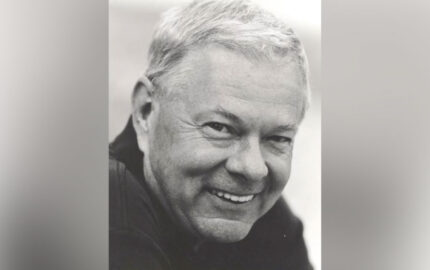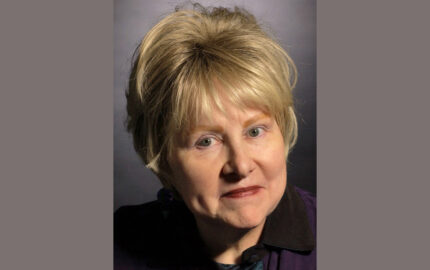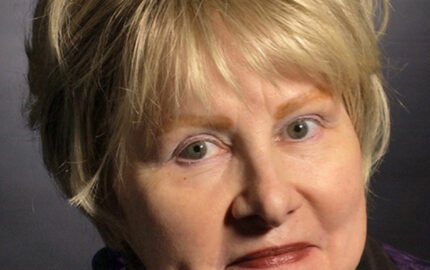Jacob (Jack) Landau died on Aug. 9 of complications from emphysema in an Arlington, Virginia hospital. He was 74.
Known for his passionate advocacy of legal rights for journalists—and sometimes criticized for his confrontational approach—Landau was an early leader of the Reporters Committee for Freedom of the Press and served as its first executive director for 11 years. Along the way, he created the first free 24/7 hotline for journalists dealing with First Amendment issues, started the Press Censorship Newsletter (now the quarterly magazine, The News Media & The Law), and worked with other media groups to petition for state and federal laws protecting journalists. He was inducted into the Freedom of Information Act Hall of Fame in 1996.
The self-proclaimed “First Amendment guerilla” was born in Englewood, New Jersey. He started his journalism career at The Bergen Evening Record a year after completing his undergraduate studies and went on to work for The Associated Press, The Washington Post, and Newhouse Newspapers, where he worked as a Supreme Court reporter. In 1969 he briefly left the newspaper industry to serve as press secretary to Attorney General John Mitchell at the start of the administration of Richard M. Nixon and helped promote legislation that prevented the government from issuing subpoenas too easily to the news media.
A year later, after federal prosecutors ordered New York Times reporter Earl Caldwell to hand over notes from interviews with Black Panther members, a group of concerned journalists formed the Reporters Committee for Freedom of the Press. Landau left Mitchell in April 1970 and immediately joined the committee as a volunteer, becoming its first executive director in 1974.
Under his leadership, the committee took on numerous pro bono cases, fought subpoenas forcing reporters to testify about confidential sources, and successfully filed suit for access to more than 40 million White House tapes and documents that President Nixon had withheld from the public domain. By the time Landau resigned in 1985, he had helped the committee grow from its part-time, shoestring-budget origins to a full service, nationwide legal defense and advocacy organization for journalists.
“Jack was the right man for that difficult time, with the Nixon Administration pursuing an anti-press agenda,” recalled Floyd McKay, NF ’68, who wrote a 2004 Journalism Monograph on early days of the Committee. “Jack’s focused competitiveness and, yes, his prickly personality, supported working reporters during a very difficult time.”
Landau is survived by a daughter, a son, and a brother. His marriage to Brooksley E. Born ended in divorce.
Known for his passionate advocacy of legal rights for journalists—and sometimes criticized for his confrontational approach—Landau was an early leader of the Reporters Committee for Freedom of the Press and served as its first executive director for 11 years. Along the way, he created the first free 24/7 hotline for journalists dealing with First Amendment issues, started the Press Censorship Newsletter (now the quarterly magazine, The News Media & The Law), and worked with other media groups to petition for state and federal laws protecting journalists. He was inducted into the Freedom of Information Act Hall of Fame in 1996.
The self-proclaimed “First Amendment guerilla” was born in Englewood, New Jersey. He started his journalism career at The Bergen Evening Record a year after completing his undergraduate studies and went on to work for The Associated Press, The Washington Post, and Newhouse Newspapers, where he worked as a Supreme Court reporter. In 1969 he briefly left the newspaper industry to serve as press secretary to Attorney General John Mitchell at the start of the administration of Richard M. Nixon and helped promote legislation that prevented the government from issuing subpoenas too easily to the news media.
A year later, after federal prosecutors ordered New York Times reporter Earl Caldwell to hand over notes from interviews with Black Panther members, a group of concerned journalists formed the Reporters Committee for Freedom of the Press. Landau left Mitchell in April 1970 and immediately joined the committee as a volunteer, becoming its first executive director in 1974.
Under his leadership, the committee took on numerous pro bono cases, fought subpoenas forcing reporters to testify about confidential sources, and successfully filed suit for access to more than 40 million White House tapes and documents that President Nixon had withheld from the public domain. By the time Landau resigned in 1985, he had helped the committee grow from its part-time, shoestring-budget origins to a full service, nationwide legal defense and advocacy organization for journalists.
“Jack was the right man for that difficult time, with the Nixon Administration pursuing an anti-press agenda,” recalled Floyd McKay, NF ’68, who wrote a 2004 Journalism Monograph on early days of the Committee. “Jack’s focused competitiveness and, yes, his prickly personality, supported working reporters during a very difficult time.”
Landau is survived by a daughter, a son, and a brother. His marriage to Brooksley E. Born ended in divorce.


